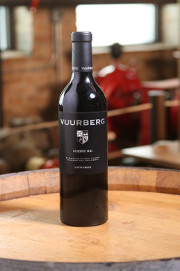- Analysis
- Vineyards
- Vinification and Aging
- Tasting Notes
- 2012 Vintage Notes
2012 Vuurberg Reserve
Wine of Origin
Western Cape
Varietals
Petite Verdot, Cabernet Sauvignon, Malbec, Merlot, Syrah
Analysis
Wine Maker: Donovan Rall
Alcohol: 15%
Total Acidity: 5.3 g/l
pH: 3.65
Residual Sugar: 2.2 g/l
The grapes are picked as early as possible and rushed to the cellar where it is not crushed only destemmed, hand sorted and transferred to tank. Fermentation occurs naturally without the addition of any yeasts after a cold soak of about 3 to 5 days. As soon as fermentation starts the grapes are given soft pigeage twice daily during the first week and then once every few days just to keep the cap wet. When the desired extraction is achieved the wine gets drained and pressed in a tiny hand operated basket press and transferred into 225l french oak barrels of which 50% is new for 22 months before bottling unfined and without heavy filtration.
Donovan Rall has perfectly created a wine that is both dark and brooding on the nose as well as the palate. The wine shows gobs of blackberry, black cherry, grilled blueberries, and cassis on the nose and has a firm grippy tannin structure. The wine finishes with carefully integrated elements of brown sugar and vanilla. An almost nervous intensity on the palate leaves you wondering how much more beautifully this wine will evolve over the next 10 years. Decanting is recommended.
The 2012 growing season began with the third straight year of noticeably dry conditions, following a winter with lower-than-usual rain levels. That, combined with a cool start to spring, resulted in reduced fruit set. Many producers noted markedly reduced crop yields, but more concentrated fruit.

